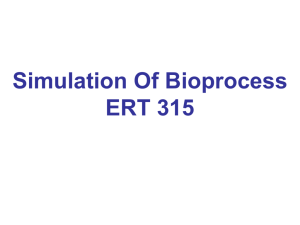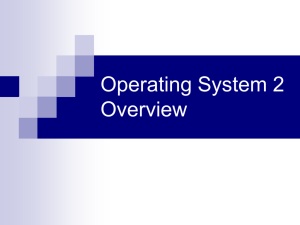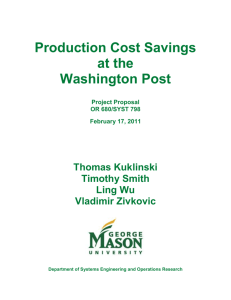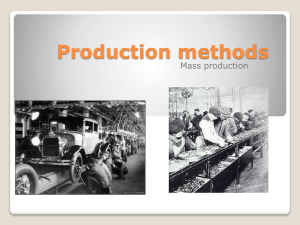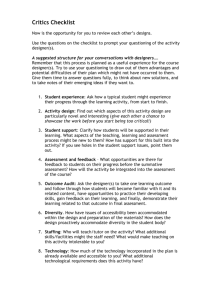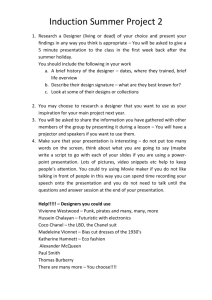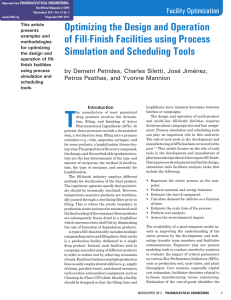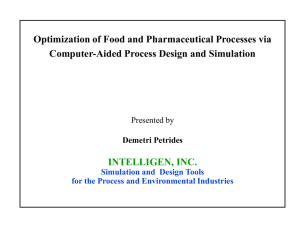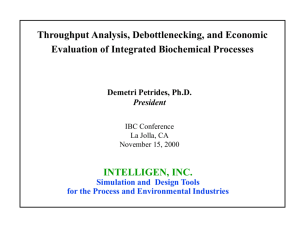“Process Simulation”?
advertisement
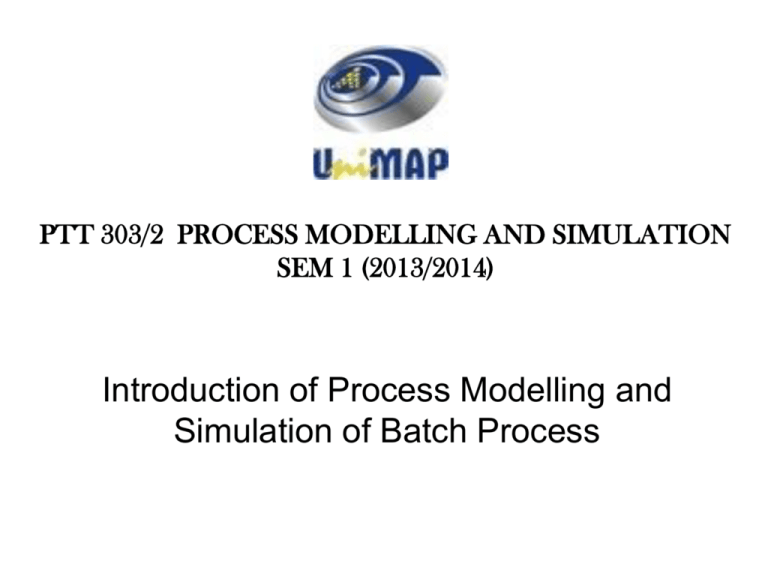
PTT 303/2 PROCESS MODELLING AND SIMULATION SEM 1 (2013/2014) Introduction of Process Modelling and Simulation of Batch Process Subject covered Modeling and optimization of batch and continuous processes Batch Process Scheduling Resources and inventory tracking Cost analysis & project economic evaluation Throughput Analysis & Debottlenecking What is “Process Simulation”? Q: What does the word “simulate” mean? Building a process model Predicting how a process would actually behave Performing an experiment (on computer) Incentives: Highly cost effective Reasonably accurate Proactive approach Sequential modular approach Individual equipment blocks may require iterative solution algorithms Overall process solution is sequential & not iterative (Turton et al., 1998) Sequential modular approach Objectives of simulation • Raw Materials • Labor • Utilities • Capital Expenses Batch Process Size Throughput / Batch Cycle Time Waste Product(s) Commercial process simulators SS Simulation Aspen Plus Dynamic Simulation Batch Oil, Gas & Petrochemicals HYSYS Solids Pinch Oleo Chemicals Specialty Chemicals Provision Design II Phys Prop Sizing & Costing Economics SuperPro Rating Sensitivity Analysis Optimization SuperPro Designer (SPD) SuperPro Designer BioPro Designer BatchPro Designer EnviroPro Designer SchedulePro Biotechnology Bio-Fuels Fine Chemicals Pharmaceuticals Food Processing Mineral Processing Water Purification Wastewater Treatment Air Pollution Control Scheduling and Debottlenecking of Multi-Product Facilities Available tools • Intuitive user interface • Wide variety of unit operation models • Databases for components and mixtures • M&E Balances of Integrated Processes • Equipment Sizing and Costing • Project Economic Evaluation • Process Scheduling & Cycle Time Analysis • Throughput Analysis & Debottlenecking • Environmental Impact • Detailed Reports and Charts for the Above User Interface of SuperPro Designer Detailed Modeling using Unit Procedures and Operations Double-Click Operations Gantt Chart Equipment Occupancy Chart Scheduling Questions • How can I schedule production during the next 6-18 months? • How can I schedule operations in an R&D facility? • How to adjust scheduling if priorities change? • Can I fit a new product into my facility? Resource Demand Chart Labor Demand Chart Cost Breakdown Consumables $0.65/g 29.1% Raw materials $0.88/g 39.6% Raw Materials Equipment Labor Consumables Lab/QC/QA Waste Trtm/Disp Utilities Facility $0.54/g 24.4% Cost Analysis Questions • What is the required capital investment for a new plant? • How much would it cost to make a kilo of product? • Which process is better for making this product? A or B? • How can I reduce the operating cost of a process? Environmental Report Stream Dialog – Env. Impact Properties Tab INTELLIGEN, INC. Bottleneck identification Debottlenecking Questions • How much product can I make in this plant? • What limits the current production level? • What is the capital investment for increasing production? Course overview • Lab 1 Overview of process simulation Flowsheet development • Lab 2 Unit procedures initialisation • Lab 3 Process scheduling Resource & inventory tracking • Lab 4 Equipment rating Project economic evaluation • Lab 5 – Biochemical case study • Lab 6 – Throughput analysis & debottlenecking strategies
